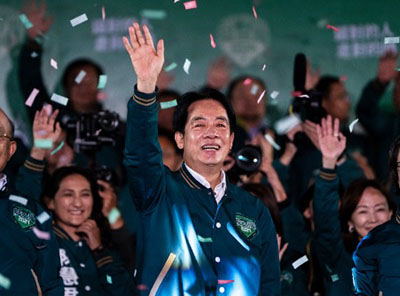by WorldTribune Staff, January 14, 2024
Lai Ching-te, the least preferred candidate of communist China, was victorious in Taiwan’s presidential election on Saturday.
Lai, who was vice president with the ruling Democratic Progressive Party (DPP), claimed 40% of the vote in a three-way race, beating out second-place finisher Hou Yu-ih of the Kuomintang (KMT), or Nationalist Party, by nearly 7 percentage points.
“Lai won despite disillusionment with the DPP over issues such as inequality and housing prices among the island’s youth, many of whom threw their support behind third-party candidate Ko Wen-je. Ko came away with 26% of the vote,” the Wall Street Journal noted.

Taiwan carries out what are among the most transparent elections in the world (see below). At each polling place, every vote is held up so that it is visible to the public. The result of each vote is shouted out, repeated, then tallied on a visible sheet of paper. Anyone can witness the vote tally, take pictures, or video. When the ballot box is empty, staff show the public that it really is.
And Taiwan’s election results are announced on the same day the election is held.
Two-term President Tsai Ing-wen, also of the DPP, is stepping down due to term limits.
“In the global election year of 2024, in this most anticipated first election, Taiwan has scored the first victory for democracy, ” Lai said in his victory speech, referring to the roughly four dozen national elections scheduled to be held around the globe this year.
The DPP on Saturday also overcame warnings from both the KMT and the communist regime in Beijing that a vote for Lai would push the island nation closer to war.
“People may have normalized PRC pressure such that it’s a constant and not a variable,” said Chong Ja-Ian, who teaches political science at the National University of Singapore, using the acronym for the People’s Republic of China.
China insisted the result won’t change the Chinese Communist Party’s resolve to bring Taiwan into its fold. “Our determination is as firm as rock,” said a spokesman for China’s Taiwan Affairs Office, according to the official Xinhua New Agency. The spokesman said Beijing opposes “separatist activities aimed at ‘Taiwan independence.’ ”
“The expectation is that Beijing will go hard on Lai,” said Yun Sun, a China foreign policy watcher at the Stimson Center, a Washington think tank.
“Clearly, this result isn’t good news with regard to peace and stability in the Taiwan Strait,” said Li Zhenguang, a professor at Beijing Union University’s Institute of Taiwan Studies.
The outlook on relations between the mainland and Taiwan is “extremely bleak,” and “confrontation and clashes may become the norm,” Li said. “This trend will cause an extremely negative impact on people-to-people exchanges across the strait.”
The U.S. State Department congratulated Lai, saying it looked forward to working with him and reiterated that the U.S. wants to see “the peaceful resolution of differences, free from coercion and pressure.” Asked about the results as he left the White House for Camp David on Saturday, Joe Biden said “We do not support independence.”
Japan and the European Union both congratulated Taiwan on the election and expressed hopes for peace in the region.
“Taiwan is an extremely crucial partner and an important friend,” Japan’s Foreign Ministry said in a statement. “We expect that the issue surrounding Taiwan will be resolved peacefully through dialogue, thereby contributing to the peace and stability in the region.”
Vincent Wu, 66, a retired stock market trader in New Taipei City, said he voted for Lai because he wanted to see Taiwan “making more new friends with all other democratic countries,” despite Beijing’s efforts to isolate it internationally.
Lin Pao-ling, 61, a housewife in the same city, also cast her vote for Lai, seeing him as the continuation of the status quo. “We hope we can still enjoy our freedom and democracy,” she said, adding that she didn’t see a Lai presidency as increasing the risk of war.
The DPP did lose control of the legislature, making Lai only the second president in Taiwanese history to confront an opposition-controlled legislature. “Chen Shui-bian’s time in office in the 2000s was marked by brutal conflicts between lawmakers, several involving their fists,” the Wall Street Journal noted.
Lai, in his victory speech, said as president he will bear “an important responsibility to maintain peace and stability in the Taiwan Strait” and promised to uphold the status quo. An additional restraint is likely to come from his party’s loss of a majority in the legislature; he said he would work with his opponents to shape policy.
Taiwan’s democracy at work. Every vote is held up so that it is visible to the public. The result is shouted out, repeated, then tallied on a visible sheet of paper.
Anyone can watch, take pictures, or film. When the ballot box is empty, staff show the public that it really is. pic.twitter.com/RdzKDnGQJM
— Cornelius Dieckmann (@CoDieckmann) January 13, 2024
Publishers and Citizen Journalists: Start your Engines
